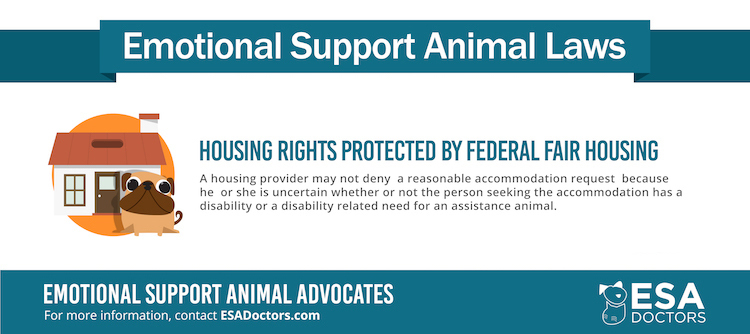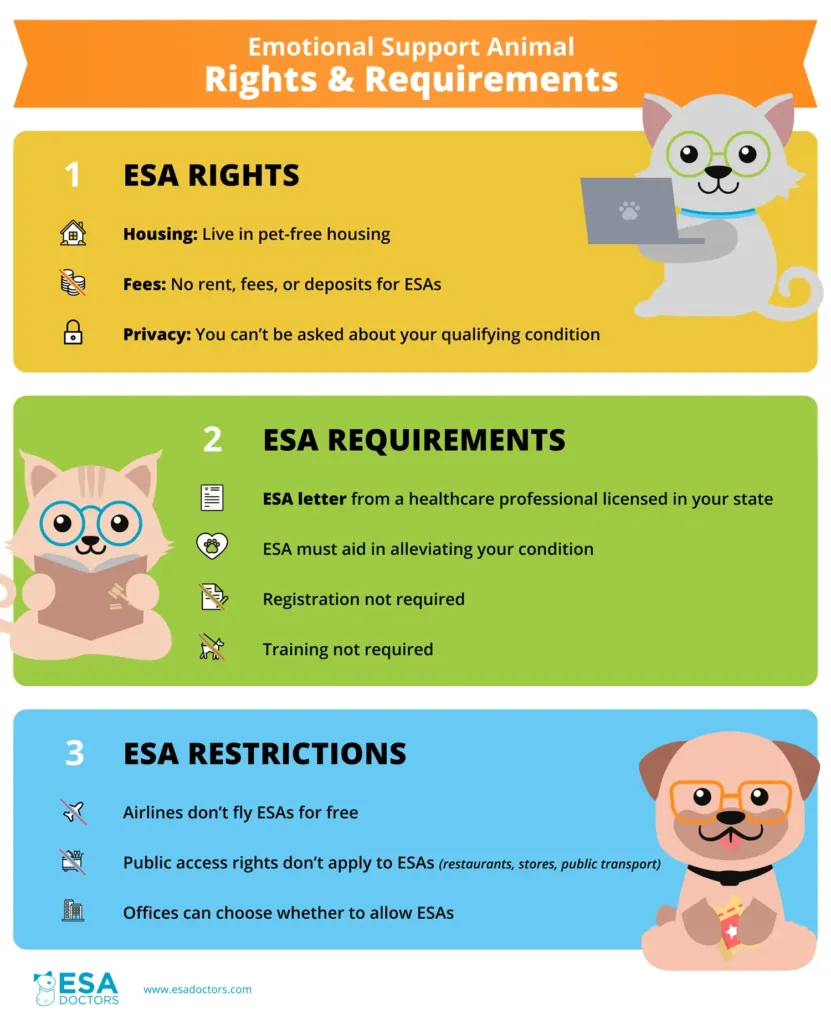Federal and state laws protect your right to have an emotional support animal in your home. Our ESA rules experts have reviewed them so you can get answers to all of your ESA-related questions about housing in no-pet buildings and whether you can travel with an ESA on a plane or bring them to a restaurant.
In this article, we explain what these laws are and how they protect you and your emotional support animal.
Emotional Support Animal Owners Are Protected by Federal Laws
There are three major federal laws that deal with assistance animals, but only one is really important for you to know if you have an emotional support animal. These laws are known as the Fair Housing Act (FHA), the Air Carrier Access Act (ACAA), and the Americans with Disabilities Act (ADA).
What is the Fair Housing Act?
Under the federal Fair Housing Act, landlords must accommodate tenants who own emotional support animals, even if the building has a policy that prohibits pets. This applies to all 50 states. The US Department of Housing (HUD) issues guidance on how the provisions of the FHA are implemented and enforces Fair Housing rules.
What is the Air Carrier Access Act?
As a result of new DOT rules for emotional support animals that came out in 2021, ESAs in the U.S. are no longer given special consideration on flights; they are treated as normal pets.
Psychiatric service dogs, however, are still protected under the Air Carrier Access Act, and all airlines must allow passengers with PSDs (and other types of service dogs) to fly in the cabin free of charge.
What is the Americans with Disabilities Act?
The Americans with Disabilities Act (ADA) specifically protects service dogs — dogs that are trained to perform tasks that help with disabilities. Think of a dog that guides someone with vision impairment through city streets or provides deep pressure therapy to someone having a panic attack. These dogs can go pretty much anywhere their handler goes – stores, restaurants, movie theaters — because they’re essential for their handler’s daily functioning.
ESAs work differently. While they provide real emotional comfort and support, they’re not covered by the ADA. This means that, unlike service dogs, they can’t automatically come with you into public spaces. Your ESA has solid rights under housing law to live with you, but they won’t be able to join you for dinner at a restaurant or shopping at the mall unless that business happens to welcome pets.

Click here to get started on qualifying for your ESA letter
Emotional Support Animal Housing Law
The FHA’s rules for emotional support animals were designed so that housing providers can’t discriminate against a person for needing an emotional support animal.
Under Fair Housing rules, ESAs are recognized as a type of assistance animal that is needed by a person with a mental health condition that significantly impairs life activities, such as depression, anxiety, or PTSD. ESAs are exempt from normal pet rules like those that prohibit dogs or restrict an animal’s size or breed type.
HUD is the government agency that oversees the FHA and investigates discrimination complaints against housing providers. HUD releases guidance on how landlords and tenants should comply with Fair Housing rules relating to ESAs. The most recent guidance was issued in January 2020.
The Fair Housing Act applies to most types of housing in every state, including rentals, co-ops, and condominiums. Some smaller landlords don’t have to comply with ESA rules: owner-occupied buildings with no more than four units and single-family homes sold or rented by the owner without the use of an agent.
To legally protect your pet as an emotional support animal, you need to get an ESA letter from a mental health professional licensed for your state. A valid ESA letter from a licensed professional is the only way to qualify for an emotional support animal under the FHA.
Under Federal Fair Housing Rules, an ESA is not considered a normal pet. Therefore, a building’s policies regarding pets do not apply to an ESA.
Rights of Emotional Support Animal Owners under ESA Housing Rules
Under the Fair Housing Act, ESA owners have the following rights:
- Exemption from no-pet policies and lease provisions
- Freedom from pet fees and deposits
- Exemption from breed restrictions
- Exemption from size and weight limits
- Right to privacy regarding specific details about health

Under HUD guidance, housing providers must consider a tenant’s ESA request and respond promptly. Housing providers are permitted to ask for documented proof from the tenant, which comes in the form of an ESA letter from a licensed healthcare professional.
HUD requires landlords to work in good faith with tenants. That means if the landlord has an objection to the emotional support animal, they should work cooperatively with the tenant to find a solution that allows the tenant to keep their ESA. Housing providers that fail to fulfill their obligations under the Fair Housing Act when it comes to ESA requests and unfairly discriminate against ESA owners face potential action from HUD and civil liability. There are limited exceptions that a landlord can use to deny a tenant’s emotional support animal.
Emotional Support Animal State Laws
Many states have their own emotional support animal laws. These laws are usually very similar to federal law and add an extra layer of protection. For example, New York and Florida have state-specific rules for emotional support animals.
Some states have rules that have different requirements from the federal regulations that you should be aware of. For example, California changed its rules in 2022 to have a 30-day waiting period to get an ESA letter if you are seeing a therapist or doctor for the first time.
Emotional Support Animal Qualification Requirements
Your pet may functionally already act as your ESA, but your pet isn’t legally your ESA until you get an ESA letter. A licensed therapist, doctor, or social worker can recommend an ESA if they believe one would help you with a mental illness or emotional disability.
An ESA recommendation letter:
- states that you suffer from a mental or emotional disability and that the ESA is necessary to alleviate symptoms of your disability;
- states the type of animal(s) you have;
- is written by a licensed healthcare professional;
- must be signed and dated by the provider; and
- must include the LMHP’s license and contact information so the housing provider can verify the letter.
Your pet is not recognized as an ESA in the eyes of the law until you obtain an ESA letter.
ESA laws also protect the privacy of an ESA owner. Landlords are not allowed to request specific details regarding your health condition and cannot ask for your medical records or order a medical examination. As an ESA owner, you have a right to protect sensitive and confidential information regarding your health.

Qualifying for an ESA Letter
If you’re having trouble finding a licensed healthcare professional, ESA Doctors can help connect you to a friendly and experienced professional who is licensed for your state.
These licensed professionals can help assess whether an emotional support animal is right for you and, if you qualify, can write an ESA letter that you can confidently submit to your landlord.





What kind of extra documentation might a landlord require?
Landlords can require both an ESA letter and an additional document, that they provide, to be filled out by your therapist.
If my doctor refuses to send the extra confirmation can my landlord deny me even though I already gave them my emotional support dog letter?
If the information on the extra document is too invasive, your doctor can reject the document. Landlords must follow medical privacy laws and cannot refuse your ESA if you do not wish to provide private medical information.
Thank you. My landlord is giving me beef about my dog. I am disabled and have provided my disability papers and letter from therapist. The 55 and older trailer park has a 20 lb. wt. restriction and my dog is 31 lbs.
Emotional support animals cannot be denied due to weight limitations in your trailer park.
My HOA has a personal vendetta against me and is making me jump through hoops to keep my emotional support dog. Saying I need paperwork from the NSAR. Do you know what paperwork she means? Also shes asking for Documentation from previous doctors stating how long I’ve Suffered from depression and anxiety.
They are also fining me $100 a day to have my dog in my condo and threatening to put a lien on my condo and tow my cars. She also said I have to have all of my paperwork in by October , 2019 which is impossible to do since that’s 4 days from now.
Should I contact a lawyer at this point?
We always advise clients to contact a lawyer if they are having legal issues – we’re not lawyers and are not permitted to advise on legal situations. We are not clear on what your landlord means by “NSAR”. If your landlord is referring to a registry, you should be aware that emotional support animals are not required to be “registered” and that registries for emotional support animals have no weight under relevant ESA laws. To have a valid ESA you need a recommendation letter from a licensed mental health professional, which can include your doctor. You should also be aware that your landlord is not allowed to asked for detailed information about your medical history. Please see here for additional information: https://esadoctors.com/fair-housing-act-emotional-support-animals/
Does a registered ESA count towards town dog limit as a home owner?
An ESA is not considered a pet and does not count towards pet restrictions. An ESA is also not “registered”. You may find this link helpful in understanding how to qualify an ESA: https://esadoctors.com/how-it-works/
Does the apartment have the right to say that until the esa is approved, it cannot live with you?
The landlord must approve your ESA before it moves in. You should also be aware that the Department of Housing has stated that landlords cannot unreasonably delay responding to ESA accommodation requests.
Can a landlord put a size,breed, weight stipulation on an ESA?
No, emotional support animals are exempt from size, breed and weight discrimination. ESA’s are only judged on their behavior. If your ESA poses a threat to other tenants your landlord may have a claim to deny your ESA access.
The letter should include the number of animals you have.
My support animal is a medical nessesaty. Can my land lord ask me to remove him due to a dog fight?
Landlords are allowed to deny an ESA if they determine the ESA poses a safety or help risk to others. If an ESA has attacked another animal, that may be grounds for denial of accommodation.
I have an ESA dog, I have all the correct paperwork, also is registered in the state of New Jersey as a ESA and I still can’t have my ESA dog with me. Can anyone please help me?
First, we would clarify that registering an ESA does not confer any official status. The only way to qualify an ESA is by having an ESA recommendation letter from a licensed healthcare professional. If your landlord rejected your ESA request even though you had a valid ESA letter, they need to give you a reason for doing so pursuant to Fair Housing rules.
Do esa dog have to be leashed if also going to be in training for a service dog?
There is no requirement that an ESA be leashed at all times.
My psychiatrist, who I’ve been seeing for years, charged me $150 to write my ESA letter and it was only a short paragraph. Is that even allowed for a psychiatrist to charge money to write them?
A psychiatrist and any other licensed professional is certainly allowed to charge for their time in evaluating your need for an ESA and writing a letter for you if you meet their requirements.
a hotel is charging for a pet fee…$100 for my ESA pet. I am maybe improperly informed but was told they can’t charge for a ESA Pet after showing mine and the pets proper credentials?
ESAs have rights in your home pursuant to the Fair Housing Act and on flights pursuant to the Air Carrier Access Act. They do not have the right to stay in hotels free from any pet charges. People often confuse ESAs with service animals, which have greater rights than ESAs do.
Does my pet have to be a certain age?
There is no specific age requirement for an ESA.
can an apartment require you to sign a pet addendum for an ESA when you have already given them your paperwork from your doctor regarding your ESA? also in this case can they request you give the dogs shot records as well?
The Department of Housing has not given specific guidance on this. Some landlords do require an addendum, which are sometimes reasonable but sometimes well beyond the scope of what they are permitted to ask for.
Does an ESA ever stop being an ESA?
I have a letter from my therapist from 2015 stating that she recommended I obtain a cat as an ESA for my mental health, due to my father passing away suddenly in an accident. This letter and her ESA Certificate (I did get her registered) has been enough for 3 different apartments, but my current complex wants me to fill out an addendum verifying that I have a mental illness and send an additional form to a therapist to fill out confirming my illness.
I haven’t had a therapist in a couple years now. Does an ESA stop being an ESA if you can’t document that you currently have any mental illnesses?
First, you should understand that “registering” your ESA does not legally qualify your animal companion as an ESA. The only way to have a valid ESA is to possess a recommendation letter from a licensed mental health professional. An ESA does not technically ever stop being an ESA, but there are some considerations to be mindful of. For air travel, ESA letters expire after one year and must be renewed. ESA letters do not technically expire for housing under the Fair Housing Act, but therapists will generally not complete additional forms and verifications if they feel the original assessment and recommendation are dated. Your letter is now about 4 years old – your therapist will likely require a new assessment and letter in order to fill out the addendum.
Can a city ordinance for breed restrictions tell me I can’t have my ESA? They said because she is a pitbull I have to get rid of her or they will take her and put her down?
This is a complex issue involving the interplay of federal and local laws. Fair Housing rules and guidance issued by the Department of Housing has specifically stated that breed restrictions are not permitted when it comes to ESAs. That should theoretically override local laws, but in practicality, you may run into issues with the local authorities anyway. There is no clear cut answer or predictable outcome unfortunately.
My son is disabled and I took him to his mental health doctor who wrote out an ESA letter for him. When we presented letter to our landlord they refused to accommodate him and his wife said they would let us out of the lease to find another place if we want to continue with the ESA
We are very sorry to hear that. If your landlord is presented with a valid ESA letter, they must accommodate your ESA except in limited circumstances, such as if your ESA presents a danger to others or the accommodation would result in an undue financial burden. If your landlord is rejecting your ESA request, they must give you the specific reasons they are doing so.
The only reason they have given us for refusing our ESA is they have uneasy feeling due to how past tenants have done them with pets not a Esa
I have an ESA through my dr and my boyfriend’s landlord doesn’t allow pets. Is that landlord supposed to allow us in or not?
A valid ESA must be accommodated even in buildings that have a no pets policy.
Can a city ordinance that considers (5) dog breeds; pit bull, rottweiler, akita, chow and doberman to be dangerous dog breeds prevent me from buying a home in that city and allowing me to have my emotional support animal?
This is not a clear cut issue. Generally, FHA rules prohibit restricting ESAs based solely on their breed. There has been at least one court case that found this FHA rule overrode local ordinances regarding breed restrictions.
Can my landlord make me get obedience training for my ESA dog
HOLY SH@@ I am sure there are people who honestly need the emotional support of a loving animal, to safely get thru their day (and night). but once again the country has thrown common sense out the window. Many people are allergic to animals, or afraid of them, or simply recognize that animals dont belong in grocery stores. If this needs to be a law there MUST be sensible parameters set up too. Suppose my next door neighbors idea of emotional support is a pet rattlesnake? Should I, and others be forced to accept this? Perhaps limiting the type of animal, and, yes, even specific breeds of dogs that statistically are shown to be aggressive. Should be limited.
Because some people will test the limits and patience of the society they live amongst just because they can. In addition to those parameters, there need to be repercussions for infractions. I have a dog that I love, too we play, walk and sleep together. Sometimes hes my only friend but I dont believe my dog OR YOURS belongs in restaurants, grocery stores, church or pretty much anywhere except my home. The limitations and regulations should have been written before any such wide ranging law be put into effect. Where is our common sense?
It is a common misconception that ESAs have free access to public places like restaurants, grocery stores and churches – they do not. There are already federal regulations that set up sensible parameters for ESAs, the Fair Housing Act and the Air Carrier Access Act, which allows people to live at home with their ESAs and fly with them. An ESA can also be rejected by a landlord or airline if the ESA poses a threat to others. However, both the Department of Housing and Department of Transportation have given guidance that categorical bans on certain breeds is not allowed.
Yes, there are some who take advantage of situations.
I am happy that you and your pet share a great bond.
The difference between you and me is that I have Depression. If you had Depression, you might better understand how an ESA could really make a difference in someone’s life.
All the best to you.
I suffer from severe depression, PTSD, and anxiety. The u.s. a thing called medications. Yes my dog helps me, but that does not mean she needs to go into places that she had no place being. Believe it or not, an emotional support animal is a crutch for people who don’t want to get help. And the should be restrictions. What can a snake or spider or horse or camel or anything else like that do that a small dog or cat can’t do.
Many people turn to ESAs for support when medications have failed them, or the side effects outweigh the benefits of the drugs. ESAs do NOT have the right to go wherever they want – they are only protected in the owner’s residence and for air travel. There are many rules and regulations already in place that restrict what ESAs can and cannot do. Also saying an ESA is a “crutch for people who don’t want to get help” is very cruel and uninformed. An animal companion can only qualify through a recommendation from a licensed health care professional. We should applaud people who have the courage to recognize they have mental health issues and take active steps to address their problems.
As stated thoroughly throughout this website there are laws and regulations, and while there is a difference between an ESA and service animal, there are certain times when discrimination has to come into consideration. I have a German Shepherd husky mix and a long haired tabby, both signed as ESAs. While there is little to no problems with the cat, most places will have policies stating either “no pets”, a weight or breed limitation. Generally,most places I’ve seen with weight averages 25-35lbs leaving a lot of breeds that would be biasedly appropriate (such as a golden retriever) out of that catagory. Secondly, while certain breeds are “statistically shown to be aggressive” that is not true for every single dog that falls under that category, and we deny the minority that do deserve to be given rights or prevented from such discrimination. I’ve volunteered at shelters and have seen aggressive dogs, not just pits. I’ve seen pitbulls who were completely tame be put down due to overpopulation and discrimination. I’ve known all kinds of dogs from smaller dogs generally accepted by apartments that were possessive, destructive things that poses a threat to the right of having animals in dwellings, and plenty of those “statistics aggressive breeds” actually be the better ones to keep in a home, who also provide a better sense of guarding and security if ever the need arises. My dog, who has to put up with those discriminatory factors simply because of his breed and weight deserves these rights an ESA provides. He is well mannered with training all of his life, has lived inside a dwelling for 12 years, and has never been destructive nor aggressive to anyone. So please, if you want to talk about common sense then please utilize it beyond those typical desensitized, not wanting to deal with the hassle or responsibility policies and look at the bigger perspective. Know this is not an excuse to have any and every animal, nor is it a means to accommodate having them any and everywhere. You are right that there are those who need emotional support animal, I being one of them. I only ask that you please keep a more open mind and consider a case individually rather than being biased to closing off towards those who do not deserve to be discriminated against due to other negligent pet owners shortcomings.
We agree that it is unfair to discriminate against certain ESAs solely because they are a certain breed. The Department of Housing has taken the same stance, which is why they prohibit categorical breed restrictions. Each prospective emotional support animal should be assessed individually.
I have a question about any kick back you might have gotten for having 2 ESA’s. I have a letter for my 2 cats as ESA’s but my apartment is trying to charge me a non-refundable $300 deposit and an extra $35 on top of my monthly rent for one cat. They said they’ll only accept one ESA and I have no clue if they are legally allowed to do this or not.
Landlords are not permitted to charge fees and deposits in connection with any valid ESA. Multiple ESAs are allowed as long as you have a valid ESA letter that covers them.
My dog is allowed to live here rent free however there are quite a few of us that walk our dogs inside our courtyard. We are very diligent about picking up after our dogs however there is a policy that states no pets allowed in the complex outside common areas. People have complained because our dogs urinate on a Bush and although sprinklers go on every day and wash the urine away. Now the manager is telling us to walk our dogs in here but dont let them go
If you have a support or ESA dog for emotional support in a building that does not allow dogs is it OK that you leave it alone in condo and go to work all day long
The FHA requires reasonable accommodations for emotional support animals. Leaving a dog home while you work seems like a reasonable accommodation to us.
Can the management of the apartments require you to register your ESA?
Emotional support animals do not need to be registered as such.
Can a landlord require that the ESA letter be from a local physician? I’m moving to a location from a different state and they are telling me it has to be local and can’t be from my therapist who is licensed and has been treating me for a year.
We are not aware of anything under the Fair Housing Act that allows a landlord to make this demand. The letter should be sufficient if it comes from a licensed mental health professional who has evaluated you.
No. Landlords must accept your ESA no matter size, weight or breed. You do need to have a doctor fill out a reasonable accommodation form & submit it to the landlord. That’s it. The landlord also cannot require a pet deposit or any money related to an ESA or service animal.
That is generally correct, the only thing we would clarify is that landlords can reject your ESA if it poses a threat to the health and safety of others. Also, an ESA letter does not have to come from a doctor, it can be from any licensed mental health professional.
Are you required to state the breed of you esa to a potential landlord
Your landlord cannot discriminate against your ESA on the basis of breed, but it is reasonable to provide them information about what your ESA looks like.